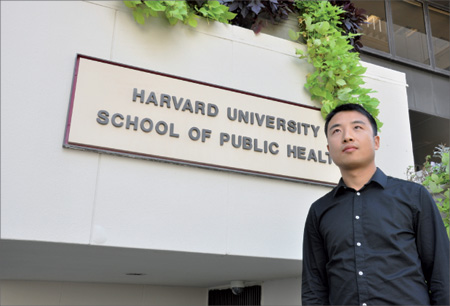Chinese grads abuzz with ideas
Updated: 2011-10-28 11:25
By Zhao Yanrong (China Daily)
|
|||||||||
|
Liu Zhonghua, a doctoral student at Harvard University, is planning to create an e-commerce company in Boston in a few months. The idea is to provide information such as medical devices and products for pharmaceutical and biotech companies in the US. [Zhao Yanrong / China Daily] |
BOSTON - While protests rage on about government accountability and low employment rates, Chinese students in the United States are trying to create jobs through business ideas.
The diversified education system in the US helps college students create businesses before graduation, Kai-Fu Lee, former Google China president and current CEO of Innovation Works, said at a Chinese college students' innovation summit in April.
Chinese students who have been studying in US for a few years said they have more advantages in creating innovative ideas compared to their peers back in China.
"I have never been so close to the idea of having my own company. I thought about it before I enrolled in Harvard, but it was just a thought," said Liu Zhonghua, a doctoral student at the Harvard School of Public Health (HSPH). He is studying molecular and genetic epidemiology and specializing in statistical genetics.
Liu and his roommates, Ke Weixiong and Weng Jia, who recently graduated from HSPH, plan to open an e-commerce company in Boston in a few months. Their idea is to provide information such as medical devices and products for pharmaceutical and biotech companies in the US.
He would not reveal any specific details about his startup except to say their investor is a Chinese-Canadian who is an acquaintance.
"Our target market right now is America, but we will likely expand our business to China after our company is listed in the US," Liu said.
The 26-year-old Chinese native said his company will have two major competitors in the market but also said he is confident that his company will surpass his American counterparts within one year.
"Working with a Chinese student organization helped me realize my business idea," said Liu, who is the president of the HSPH Chinese Students and Scholars Association (CSSA).
Liu met many students who have their own business ideas as well as young business owners at social events hosted by the Chinese student organization.
"Our ideas about this company became much clearer after talking with those people and attending events, such as startup competitions," he said.
An entrepreneurship club at HSPH CSSA was created to encourage more Chinese students to start their own businesses. The student organization teaches Chinese students how to open a company in the US, how to make a profit and how to register a company in the US as an international student.
"On the one hand, many Chinese students and graduates work for companies to legally remain in the country, while on the other, they are also creating their own businesses and companies," Liu said. "It's very common in the US now."
In fact, more venture capital companies from China are holding innovation competitions among Chinese student communities at American colleges.
In November, the Massachusetts Institute of Technology will announce the winner of the first Chinese student innovation competition called "Pitch to China". Six teams, culled from 98 total proposals, will divide $18,000 in cash prizes.
Many entrepreneurship competitions are held among American universities, but the participation from Chinese students has been low, said Cui Yuanyuan, a MIT student who is on the Pitch to China competition committee.
"We are encouraging Chinese students and Chinese enterprisers to stand out and say what they want. We hope this will be a good opportunity for all Chinese," said Cui, a doctoral candidate in computational and systems biology.
Before finding their investor, Liu tried a few Chinese venture capital companies who prefer to invest in student's ideas overseas. But he never received any feedback after proposing his business plan.
"A personal relationship makes it easier to build trust and cooperation with the investor. And we can more public financing once our business expands," Liu said.












